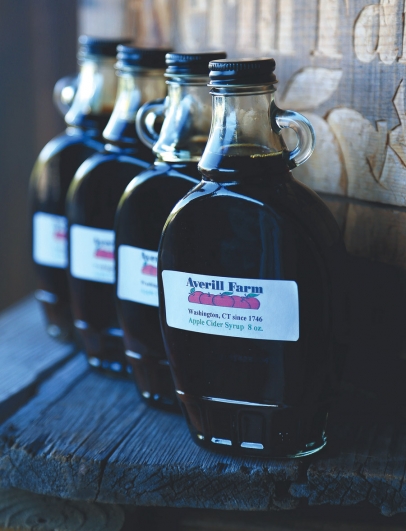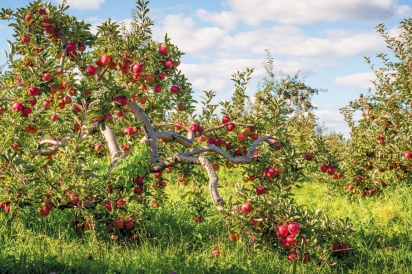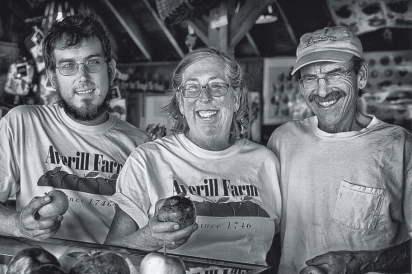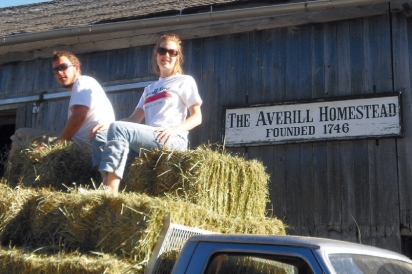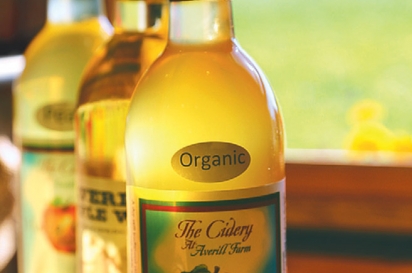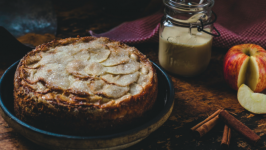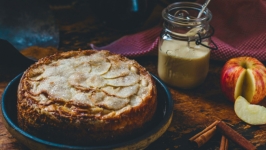Boiled Cider History Preserved at Averill Farm
Tyson Averill stands at the crest of a hill, surrounded by a sweeping orchard, in the shade of his 185-year old stone house in Washington, Connecticut. His newborn son, Nate, sleeps inside; his father, Sam, out on a hay delivery. Tyson represents the 10th generation of the Averill family to have toiled on this plot of land, bought in 1746 from one of Chief Waramaug’s heirs, and paid for with, according to Tyson, “a bunch of sterling silver.”
The Averill family’s long history is visible in the artifacts that dot the property. The family graveyard – surrounded by a stone wall with an entrance guarded by two monolithic stone lions – marks where Averill family members have been buried since the late 18th century. One of the graves belongs to Betsey Averill, who was born in 1787 and lived to be 103 years old. For Tyson, the family’s history often proves to be too much information; the more he learns, the more he forgets. He admits that his wife, Jennifer, knows far more. This he follows with a smile and a shrug when he tells me that one of his relatives “may or may not have been hung as a witch in Salem” (Sarah Wildes, née Averill, who was, in fact, executed by hanging and later exonerated).
Concordant with the myriad hands that have worked it, this 260-acre property has been put to use in many different ways over the years. Originally, cows were raised for both dairy and beef. The modern-day Averill Farm no longer keeps cattle and instead offers a host of different agricultural products, ranging from flowers to Christmas trees. But for many visitors to Averill Farm, one crop tops the list: apples. Local customers are familiar with Averill Farm’s diverse selection of apple products, including sweet cider, hard cider, cider doughnuts, and even old-fashioned pick-your-own jaunts through their orchard, but the most recent addition to their product line, boiled cider (also known as “cider syrup” or “apple molasses”) may seem new to many, despite its long and storied history in New England. Contained in this bottle of dark reddish-brown syrup is a history similar to that of the Averill family, one of long-standing New England tradition.
HISTORY, BOILED
Boiled cider has roots dating back to colonial America. Settlers in Massachusetts are recorded to have been making and using it as far back as 1677. It was a simple product to make, produced by boiling the season’s sweet cider and stirring occasionally, until the water content of the cider had evaporated, and a syrup-like consistency was achieved. Valued for its long shelf life, it helped to preserve an apple crop far beyond the extent of the autumn harvest period. Tyson relates recent stories of people cleaning out old basements and finding forgotten stashes of boiled cider that had languished for decades, discovering them still in excellent and edible condition.
In colonial times, boiled cider was primarily used for baking, in dishes like mincemeat and apple pies, baked beans, squash, and pork roast. It was an indispensable table sweetener, as well, often used for smothering pancakes. It even served as a method of preserving the cider, itself; with the addition of water, the syrup could be reconstituted into its original form.
Beyond its many functions in the kitchen, boiled cider also satisfied another important utility; it reduced dependence on imported sweeteners, such as molasses imported from the West Indies. But it did not merely replace its imported competitors; it offered a different taste profile. Where a more popular sweetener like maple syrup offers a rich, direct sweetness, boiled cider hits the palate with a concentrated tartness that is tempered by the sweetness of apple and is finished with earthy notes of caramel, smoke, and wood.
Despite its historical significance and ease of production, boiled cider has largely slipped out of the public consciousness and quietly become a commercial obscurity, lying in the shadows of honey, maple syrup, and molasses.
REDISCOVERING TRADITIONAL FOODS
After finishing college in St. Louis, where he received a degree in aerospace engineering, Tyson found himself back at Averill Farm and began to experiment with traditional, apple-based products. Among these was Averill Farm’s first run at commercially producing a hard cider, in 2012, using recipes Tyson began working on in 2008. “It was really my mom’s idea,” he admits, “I mentioned I was going to make a batch of beer, and she said, ‘Why are you making beer? You should be making hard cider.’” Since then, he has branched out from his original, standard, dry hard cider to make ice wine, hop cider, and soon will be adding sparkling dry and sweet cider to the roster, as well.
Tyson’s foray into making boiled cider came more recently, in 2015, as a result of New England’s exceptional apple season that left Averill Farm with an extensive surplus of fresh apples. Tyson immediately recognized the synergy that the syrup could have with his other products. “Instead of adding honey and sugar to my wine, I started adding the boiled cider.”
Inspiration to start making boiled cider struck Tyson three years ago, when he observed boiled cider production while attending Franklin County Cider Days, an annual gathering in Franklin County, Massachusetts, that hosts seminars and workshops related to cider. Without the equipment to make it himself, he turned to Mark Mankin of Sullivan Farm in New Milford, who let him borrow the required evaporator.
“I brought some cider over – just 50 gallons to start – and tried a little batch and had it for sale at the end of November last year. And it sold really well, so I decided to make a lot more. And at that point, once we decided it was selling well, I just had to pick, pick, pick and tried to get as many apples as I could off the trees before they froze.”
Tyson has been pleased by the reception that boiled cider is having with his customers. “I think it’s something that maybe they haven’t seen before, and they’re visiting an old and historic farm, so why not try something that’s a part of that history?”
Boiled cider is a product that was once of vital importance to preserving the nutrition of a fall apple harvest long into the next year. Thanks to the efforts of Tyson Averill and other apple farmers across the state, it would seem that it is finally getting ready to rejoin the family of foods that once made Connecticut a place so rich in local food diversity.
> Averill Farm: 250 Calhoun St., Washington Depot; 860-868-2777


